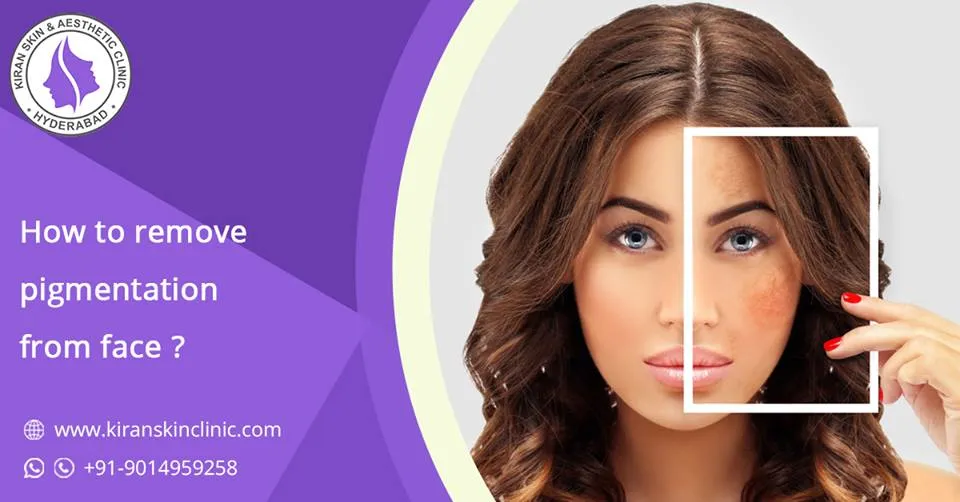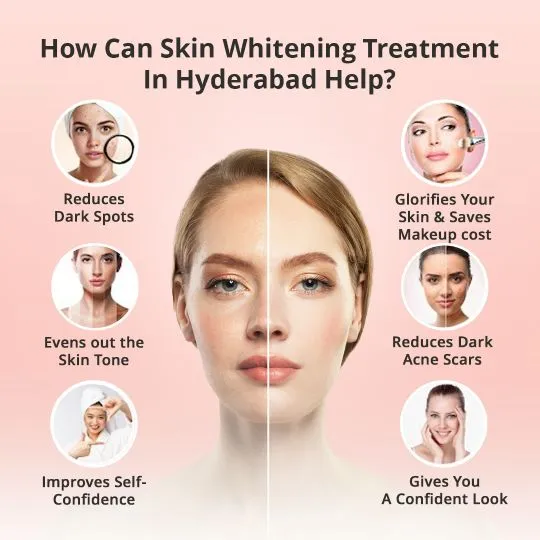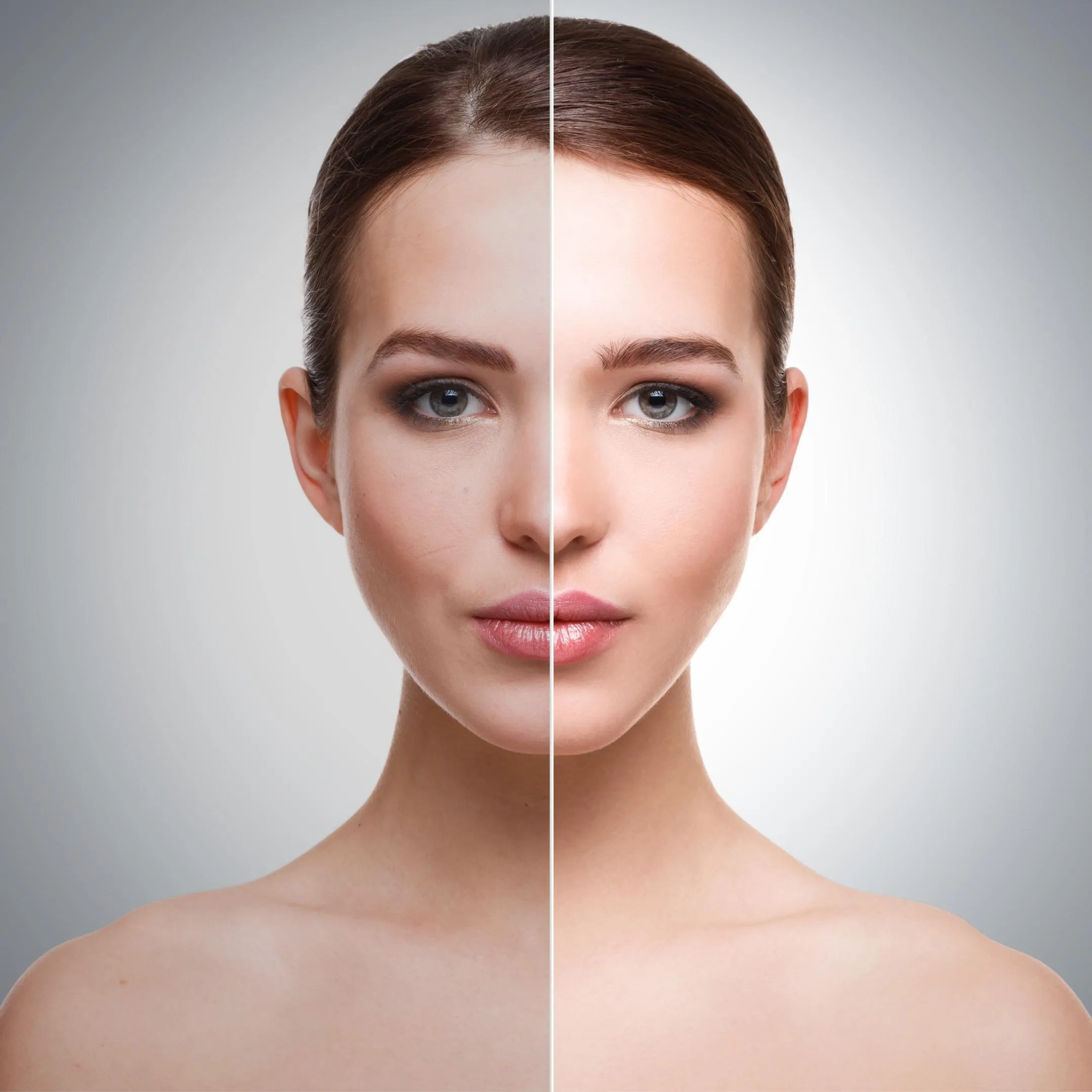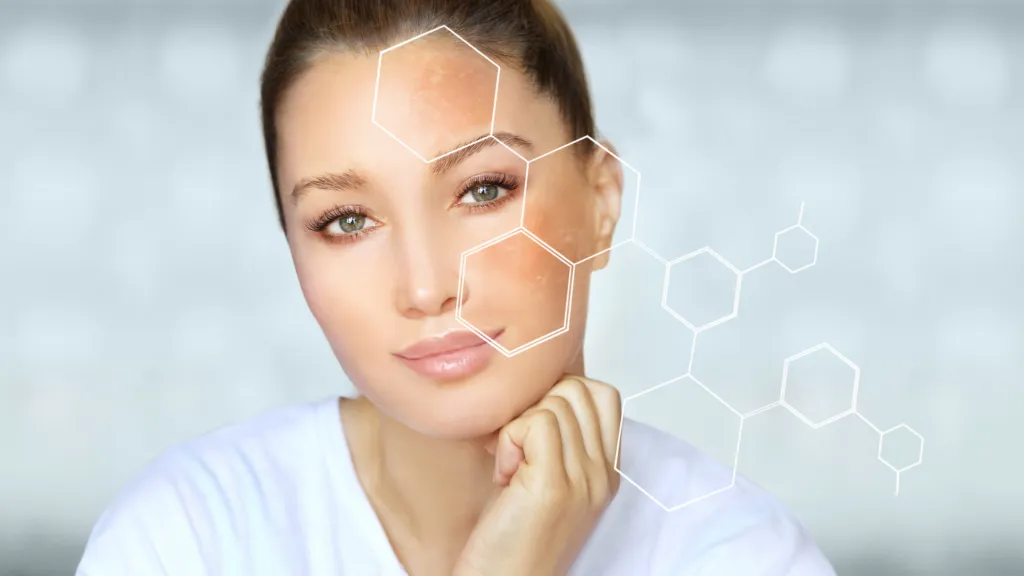Understanding Skin Whitening
Skin whitening, also known as skin lightening, is a cosmetic procedure aimed at reducing the melanin pigment in the skin to give a lighter complexion. Many people in Hyderabad and across the globe seek these treatments to address issues like uneven skin tone, hyperpigmentation, dark spots, and the desire for a brighter, more radiant appearance. The popularity of skin whitening treatments has surged in recent years, driven by aesthetic preferences and the availability of advanced, effective procedures. However, it’s crucial to understand the different approaches, potential risks, and the importance of consulting with a qualified dermatologist before undergoing any treatment.
What is Skin Whitening
Skin whitening involves various methods designed to lighten the skin. These methods work by either reducing the production of melanin or speeding up the shedding of pigmented skin cells. Melanin is the pigment responsible for skin color, and factors like sun exposure, genetics, and hormonal changes can influence its production. Skin whitening treatments can target specific areas or be applied to the entire body. The effectiveness and suitability of a particular treatment depend on individual skin type, the extent of pigmentation, and personal goals. Understanding the science behind skin whitening is crucial to make informed decisions and manage expectations.
Benefits of Skin Whitening

Skin whitening treatments offer several potential benefits beyond simply lightening the skin. Many treatments address issues like hyperpigmentation, which includes dark spots, age spots, and uneven skin tone caused by sun damage, acne scars, or hormonal changes. By reducing these imperfections, skin whitening can lead to a more even and youthful complexion. Many individuals report increased self-confidence and improved self-esteem after undergoing successful skin whitening treatments. In addition to cosmetic advantages, certain treatments, like chemical peels, can also improve skin texture and overall skin health. However, it is essential to consider the potential risks and consult with a dermatologist to determine if these benefits align with your needs.
Top 5 Skin Whitening Treatments in Hyderabad
Hyderabad offers a variety of skin whitening treatments to cater to diverse needs and preferences. From advanced laser therapies to minimally invasive procedures, the city provides a spectrum of options, each with its own benefits and considerations. This section explores the top five skin whitening treatments readily available in Hyderabad, highlighting their mechanisms, potential outcomes, and factors to keep in mind. Understanding these options will help you make informed decisions and choose the right treatment for your specific skin concerns. Remember, consulting with a qualified dermatologist is crucial to determine the most suitable approach for your skin type and goals.
Chemical Peels for Skin Whitening
Chemical peels are a popular skin whitening treatment that involves applying a chemical solution to exfoliate the skin and encourage new cell growth. This process helps to remove the top layers of damaged skin, revealing a brighter, more even complexion. Chemical peels come in various strengths, from mild superficial peels to deeper peels that target more significant skin concerns. The selection of the peel type depends on the specific issues being addressed and the desired results. Chemical peels can effectively treat hyperpigmentation, sun damage, and acne scars, and can significantly improve skin texture and tone. The process is usually quick, but the recovery time varies depending on the depth of the peel.
How Chemical Peels Work

Chemical peels work by causing controlled damage to the outer layers of the skin. This controlled damage stimulates the skin’s natural healing process, leading to the production of new skin cells. The chemical solution, often containing ingredients like glycolic acid, salicylic acid, or trichloroacetic acid (TCA), penetrates the skin to different depths depending on the peel type. As the old, damaged skin sheds, it reveals a fresh, more evenly pigmented layer underneath. The exfoliation also stimulates collagen production, which can improve skin firmness and reduce the appearance of fine lines and wrinkles. The effectiveness of chemical peels varies based on the strength of the peel and the individual’s skin type.
Benefits of Chemical Peels
Chemical peels offer numerous benefits for skin whitening and overall skin health. They effectively reduce hyperpigmentation, including dark spots, age spots, and melasma. The exfoliation process helps to even out skin tone and texture, leading to a smoother, more radiant complexion. Chemical peels can also improve the appearance of acne scars, reduce the frequency of breakouts, and minimize the appearance of fine lines and wrinkles. The benefits extend beyond cosmetic improvements; chemical peels stimulate collagen production, leading to improved skin elasticity and firmness. However, potential side effects can include temporary redness, peeling, and sensitivity to sunlight. Proper aftercare is essential to maximize the benefits and minimize any risks.
Laser Skin Whitening
Laser skin whitening uses focused beams of light to target and break down melanin in the skin. This method is highly effective for reducing pigmentation and achieving a lighter skin tone. Laser treatments are particularly effective for addressing specific areas of hyperpigmentation, such as sunspots or age spots. The precision of laser technology allows dermatologists to target the problem areas while minimizing damage to surrounding skin. Several laser types are available, each with unique properties and applications. The choice of laser depends on the individual’s skin type, the nature of the pigmentation, and the desired outcome. Laser skin whitening is a popular option in Hyderabad for its effectiveness and ability to deliver noticeable results with minimal downtime.
Types of Laser Treatments

Various laser treatments are available for skin whitening, each with its distinct features and benefits. Q-switched lasers are commonly used to target melanin and break down pigment particles. Fractional lasers, such as Fraxel, create micro-injuries to stimulate collagen production and improve skin texture. IPL (Intense Pulsed Light) is often used for treating a broad range of skin concerns, including pigmentation issues. The choice of laser depends on factors such as the skin type, the depth of pigmentation, and the desired outcome. Dermatologists in Hyderabad typically assess the individual’s needs to recommend the most appropriate laser treatment. Understanding the different laser types and their specific applications helps patients make informed decisions and manage expectations.
Effectiveness of Laser Treatments
Laser treatments are known for their effectiveness in skin whitening. They can effectively reduce the appearance of hyperpigmentation, sunspots, and uneven skin tone. The results often become visible within a few weeks of treatment, with continued improvement over time. The effectiveness of laser treatments depends on several factors, including the type of laser used, the individual’s skin type, and the severity of the pigmentation. Multiple sessions may be required to achieve the desired results. While laser treatments are generally safe, potential side effects can include temporary redness, swelling, and changes in skin pigmentation. Proper aftercare, including sun protection, is essential to maintain the results and prevent complications.
Microdermabrasion for Skin Whitening
Microdermabrasion is a non-invasive skin resurfacing technique that exfoliates the skin’s outer layers. It involves using a device to gently remove dead skin cells, revealing fresher, brighter skin. This treatment is particularly effective for addressing superficial pigmentation issues, improving skin texture, and reducing the appearance of fine lines. Microdermabrasion is a popular choice for individuals seeking a gentle skin whitening treatment with minimal downtime. It can be performed on various skin types and is often used as a maintenance treatment to keep the skin looking its best. Multiple sessions are typically recommended to achieve the desired results.
How Microdermabrasion Works

Microdermabrasion works by using a handheld device to spray tiny crystals onto the skin’s surface, gently exfoliating the top layer of dead skin cells. The device then vacuums up the crystals along with the exfoliated skin, leaving the skin smoother and more radiant. The process stimulates blood circulation and collagen production, leading to improved skin texture and tone. The level of exfoliation can be adjusted to suit the individual’s skin type and concerns. Microdermabrasion is a painless procedure with minimal downtime, making it a convenient option for skin whitening. The immediate effects include a brighter complexion, and the skin continues to improve in the following days and weeks.
Microdermabrasion Benefits
Microdermabrasion offers a range of benefits, including skin whitening and improvement in overall skin health. It helps to reduce the appearance of superficial hyperpigmentation, sunspots, and uneven skin tone. The exfoliation process unclogs pores, which can reduce the frequency of breakouts and improve the skin’s ability to absorb skincare products. Microdermabrasion also stimulates collagen production, leading to improved skin elasticity and a reduction in the appearance of fine lines and wrinkles. It is a safe and effective treatment that can be performed on various skin types. Following the procedure, individuals may notice a brighter, more even complexion, with continued improvement over time. Regular microdermabrasion sessions can help maintain the results and keep the skin looking its best.
Glutathione Injections for Skin Whitening
Glutathione injections are a popular skin whitening treatment that involves administering glutathione, a powerful antioxidant, into the body. Glutathione is known for its ability to neutralize free radicals, boost the immune system, and reduce melanin production, leading to a lighter skin tone. This treatment is often administered intravenously or intramuscularly. While glutathione injections are widely available in Hyderabad, it is crucial to consult with a qualified medical professional to understand the potential benefits and risks. The effectiveness of glutathione injections can vary depending on individual factors, and multiple sessions may be required to achieve noticeable results.
Understanding Glutathione

Glutathione is a naturally occurring antioxidant produced by the liver. It plays a crucial role in protecting cells from damage and promoting overall health. In skin whitening, glutathione is believed to inhibit the production of melanin, the pigment responsible for skin color, resulting in a lighter complexion. Glutathione is also known for its detoxifying properties and its ability to boost the immune system. Glutathione is often administered in the form of injections or supplements. However, the effectiveness and safety of these methods, particularly for skin whitening, are subjects of debate. Consulting with a healthcare provider is essential before considering glutathione injections.
Effectiveness of Glutathione Injections
The effectiveness of glutathione injections for skin whitening is a subject of ongoing discussion and research. While some individuals report positive results, scientific evidence supporting the efficacy of glutathione injections for skin lightening is limited. Some studies suggest that glutathione can reduce melanin production, leading to a lighter skin tone. However, the results can vary depending on individual factors, such as skin type, dosage, and frequency of treatments. Potential side effects can include allergic reactions, skin rashes, and in rare cases, more severe complications. It’s essential to approach glutathione injections with caution and to consult with a qualified healthcare provider to assess the risks and benefits.
Topical Creams for Skin Whitening
Topical creams are a common and accessible method for skin whitening. These creams contain active ingredients that inhibit melanin production, resulting in a lighter skin tone. The availability of these creams is vast, with a wide range of formulations and active ingredients, from over-the-counter products to prescription-strength creams. However, the effectiveness of topical creams varies significantly depending on the active ingredients, their concentration, and the individual’s skin type. Consulting with a dermatologist is crucial before using topical creams to ensure they are safe and suitable for your skin. Additionally, it is essential to be aware of potential side effects and follow the instructions carefully.
Types of Topical Creams

Many types of topical creams are available for skin whitening, each with different active ingredients and mechanisms of action. Common ingredients include hydroquinone, kojic acid, arbutin, and retinoids. Hydroquinone is a potent skin-lightening agent that inhibits melanin production. Kojic acid, derived from fungi, also inhibits melanin formation. Arbutin, a natural compound found in plants, is a gentler alternative to hydroquinone. Retinoids, derived from vitamin A, promote skin cell turnover and can help to reduce pigmentation. The choice of cream depends on the individual’s skin type, the severity of pigmentation, and the desired results. It’s important to use these creams under the guidance of a dermatologist to minimize potential side effects.
Effectiveness of Topical Creams
The effectiveness of topical creams for skin whitening can vary depending on the formulation and the individual’s skin. Hydroquinone is considered one of the most effective ingredients, but it can cause side effects, such as skin irritation and ochronosis (a darkening of the skin). Kojic acid, arbutin, and retinoids can provide lighter effects with fewer side effects. Regular use of topical creams, coupled with sun protection, can lead to a lighter skin tone and the reduction of hyperpigmentation. The results take time and consistency, and a dermatologist’s guidance is crucial for optimal results. It’s essential to monitor the skin for any adverse reactions and to adjust the treatment plan as needed.
Choosing the Right Treatment in Hyderabad
Selecting the right skin whitening treatment in Hyderabad requires careful consideration of various factors, including skin type, the severity of pigmentation, and personal preferences. This process begins with a thorough consultation with a qualified dermatologist who can assess your skin, understand your concerns, and recommend the most suitable treatment options. The dermatologist will evaluate your medical history, skin sensitivity, and lifestyle factors to ensure that the treatment is safe and effective for you. Understanding the pros and cons of each treatment and being realistic about the expected results are essential. Patient education about the treatment process, potential side effects, and aftercare requirements also contributes to successful outcomes and patient satisfaction.
Consultation with a Dermatologist

A consultation with a dermatologist is the first and most crucial step in the skin whitening treatment journey. During the consultation, the dermatologist will examine your skin, discuss your concerns, and evaluate your medical history. They may also perform tests to determine your skin type and identify the cause of pigmentation issues. Based on this assessment, the dermatologist will recommend the most suitable treatment options and explain the potential risks and benefits of each. This consultation helps to create a customized treatment plan that aligns with your specific needs and goals. A dermatologist can also provide guidance on aftercare, including sun protection and skincare routines, to ensure optimal results and minimize the risk of complications. Always choose a board-certified dermatologist for your treatments.
Factors to Consider
Several factors influence the choice of a skin whitening treatment, including the individual’s skin type, the extent and type of pigmentation, and their overall health. Skin type plays a significant role, as some treatments are more suitable for certain skin tones. The severity of pigmentation, whether it’s sunspots, melasma, or acne scars, also influences the choice of treatment. Personal preferences, such as the desired level of invasiveness and the availability of downtime, should be taken into consideration. Other factors include the patient’s budget, lifestyle, and willingness to commit to the treatment plan. It is essential to have realistic expectations and to understand that multiple sessions and consistent maintenance may be required for optimal results. Thoroughly discussing these factors with a dermatologist will help to identify the most appropriate treatment approach.
Risks and Side Effects
All skin whitening treatments carry potential risks and side effects, which must be understood before undergoing any procedure. Common side effects include skin irritation, redness, and swelling. Some treatments, such as chemical peels and laser treatments, may cause temporary skin sensitivity and peeling. More serious risks, although rare, can include scarring, changes in skin pigmentation, and allergic reactions. The risks vary depending on the treatment type, the individual’s skin type, and the expertise of the practitioner. Consulting with a qualified dermatologist and discussing the potential risks and side effects is crucial before undergoing any procedure. Following the dermatologist’s instructions and practicing proper aftercare can help to minimize the risks and ensure a safe outcome.
Aftercare and Maintenance
Proper aftercare and maintenance are essential for achieving and maintaining the results of skin whitening treatments. Following the dermatologist’s instructions is crucial for minimizing the risk of complications and promoting optimal healing. Aftercare typically involves avoiding sun exposure, using sunscreen with a high SPF, and using gentle skincare products. Specific instructions will vary depending on the treatment received. Regular follow-up appointments with the dermatologist are essential to monitor progress and address any concerns. Maintaining a healthy skincare routine, including gentle cleansing, moisturizing, and the use of maintenance products, can help to prolong the results. Patient compliance with aftercare instructions and maintenance protocols is vital for long-term success and patient satisfaction.
Maintaining Results
Maintaining the results of skin whitening treatments requires a proactive approach. Sun protection is paramount, as sun exposure can worsen pigmentation issues and counteract the effects of the treatments. Regularly applying sunscreen with a high SPF and wearing protective clothing can significantly extend the results. Continuing to follow a consistent skincare routine, as recommended by your dermatologist, is also essential. This may involve using maintenance creams or other products to prevent the reappearance of hyperpigmentation. Regular follow-up appointments with your dermatologist are important to monitor your skin’s progress and address any concerns. Patient compliance with aftercare instructions, lifestyle changes, and maintenance protocols is vital for enjoying long-lasting results and maintaining a brighter, more even complexion.
